Sunday, April 24, 2005
Notice a pattern?
One of the first lessons in forming an opinion is building it on good understanding and awareness using a zoom-in zoom-out approach- focus in on the small details, and focus out on the big picture. You can apply this to any aspect of your life, personal, social, or political issues.You may have noticed that I have avoided politics as much as I could recently despite events unfolding, and news emerging on a delay basis. I consider the everyday goings on as the odious details of a much bigger situation and there is no point getting bogged down in it or at least blowing it out of proportion. If you concern yourself with these details, you lose perspective, you lose hope, unnecessarily burden your mind and hence probably die-young (especially if you happen to be working on a news desk in a local paper!).
Let us zoom-out, build an overview of both the global and the historic context of our domestic issues. You'll be surprised at how everything falls into place. So much so, that certain events are pretty much predictable. Knowing this will then balance the way you deal with everyday shenanigans such as imbecilic laws and clampdowns, tit-for-tat politcs etc etc this then prevents u getting caught up emotionally in the hullabulloo of it all and then endlessly ranting about it, although naturally at times, emotions will takeover.
Now lets apply this exercise, by Zooming-out and assessing the present political quagmire in a chronological historic context. See if you can spot a pattern, events that seem recursive, in the simple time-line I now present:
1930s
In 1938, a group of leading personalities representing the main trends and sections of society in Bahrain, led a movement calling for the establishment of a parliament reforming of the newly established police force and other related demands. The leaders of that movement, amongst them Mr. Sa'ad Al-Shamlan, were forcibly deported to India (then under the British Crown). 1950s
A more powerful and broadly-based pro-democracy movement appeared between 1954 and 1956. A network of 120 dignitaries elected eight representatives to form the "High Executive Committee" representing all sections of the society. The movement demanded an elected parliament, a unified written law, formation of an appeal court and the freedom to form trade unions. Both the ruler of Bahrain, Sheikh Salman bin Hamad Al-Khalifa and Sir Charles Belegrave refused to respond to the call for political reforms.
In December 1956, a "state of emergency" was declared and the British army was deployed, leading to the shooting and killing of several people by security forces during street clashes. Later, the three senior leaders of the movement, Mr. Abdul Rahman Al-Bakir, Abdul Aziz Al-Shamlan (son of Sa'ad Al-Shamlan who was deported to Indian in 1938) and Mr. Abd Ali Al-Ulaiwat were all forcibly exiled to St. Helena in the Atlantic Ocean. A battle was fought in the British House of Commons as to the legality of British involvement in that forcible deportation. The three were then released in 1961 and given compensation by the British Government, while the other leaders remained in detention for the rest of the Sixties.
1960s
Courtesy of Reflections from Canada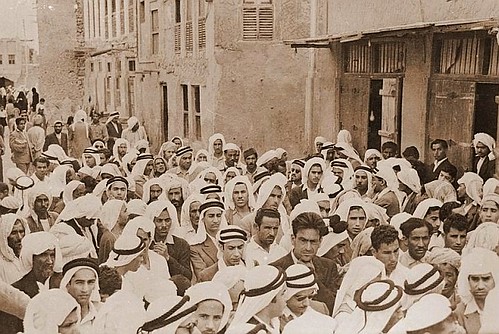 a
a
1990s
September 25, 1995- outside Sh. Aljamri's house
1994 the biggest uprising Uprising, demonstrations, petitions
 a
aIn 1965 an uprising erupted calling for freedom of speech, the right to form trade unions and other demands of social justice. Again the British army was deployed to restore the situation and several people were shot dead by police during mass demonstrations. Those who were killed include: Abdulnabi Mohammed Sarhan, Abdulla Saeed Sarhan, Abdulla Hassan Bu-Naffor, Abdulla Saeed Al-Ghanem and Faidsal Abbas Al-Qassab. No independent enquiry ever took place. However, in 1966, the Special Branch was restructured and another Briton, Mr. Ian Henderson, was called in to head the security apparatus.
1975-1995
Black era- Amir dissolves parliament and the 1973 constitution, promulgates State Security Law. The country enters the worst period in Bahrain's history, thousands arrested, tens killed, thousands deported. A pro-democracy movement started to develop with the main call for the reinstatement of parliament and restoration of the suspended articles of the constitution. The government began a process aimed at concentrating the powers in the hand of few persons from the ruling family and for this to be achieved the interior ministry was given free hand for persecuting the opposition.
The 1980s witnessed an escalation of repression and sectarianism.
The 1980s witnessed an escalation of repression and sectarianism.
1990s
September 25, 1995- outside Sh. Aljamri's house
1994 the biggest uprising Uprising, demonstrations, petitions
The millenium
2005 Sitra protests calling for constitutional reform
Source: The Parliamentary Human Rights Group Report on Bahrain 1996 by Robert Wilkinson
The point of the post was to make you realise that this is a cycle that is apparant on an eerily consistent basis, decade by decade over the last century. When will the people and the ruling family settle on a mutually satisfactory relationship? Or is THIS the equilibrium steady-state that has been so entrenched in the collective psyche that no only are we part of this cycle, we even self-fulfil it?
We must be the only country in which taking to the streets has had no direct domestic influence on authorites only when it gains international media attention. However, with all possible forms of clampdown, threats, arrests, tear gas, rubber bullets, generation after generation continue this protesting tradition. Hell, I can't even remember the first protest I ever went to, riding high on my father's shoulders.
With this approach you see, that even if the flavour of the decade changes (nationalism, communism, islamism) the contentions between the nation and the state have prevailed throughout time. Is it social, economic, religious, driving this contention? I answer you very simply that it is a combination of all factors that prevent you living with DIGNITY on you're own land.
PS anymore photos are most welcome...I'd really like to see ones from the seventies especially - when the Afros and bell-bottoms hit the streets of manama :)

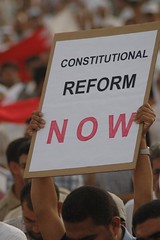


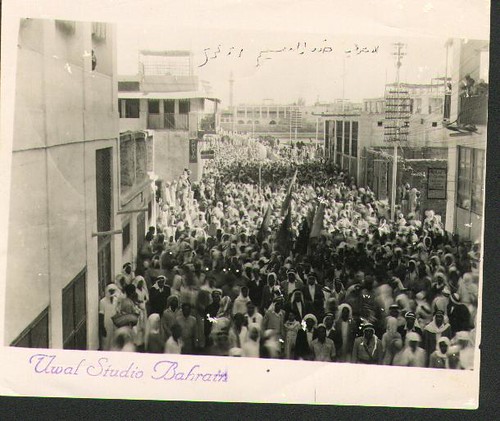
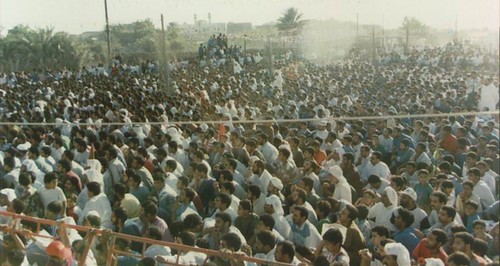
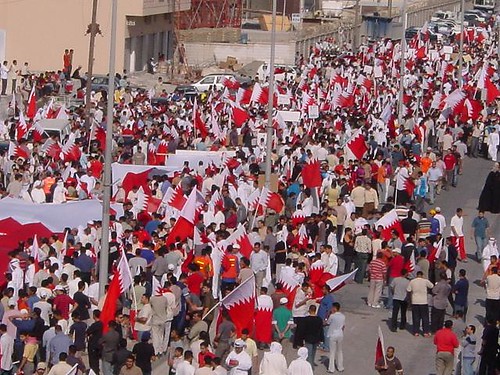
Read or Post a Comment
<< Home